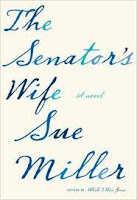 My bookshelves are lighter by another title this weekend as I finished Sue Miller’s The Senator’s Wife this morning while feeding the RRBB (well, technically he had finished and fallen asleep and I was approximating life before him by staying in bed and reading, one of my favourite Sunday pastimes). It was an interesting novel to read as one of the main characters, Meri, a woman approximately my age, gives birth to her first child and for the latter half of the novel somewhat loses herself in terms of having to redefine her life now that her son, Asa, is in the picture. The senator’s wife of the novel’s title is Meri’s next door neighbour, Delia Naughton, an older, graceful woman, whose character reminded me a little of Jackie Kennedy, whether or not that was Miller’s intention.
My bookshelves are lighter by another title this weekend as I finished Sue Miller’s The Senator’s Wife this morning while feeding the RRBB (well, technically he had finished and fallen asleep and I was approximating life before him by staying in bed and reading, one of my favourite Sunday pastimes). It was an interesting novel to read as one of the main characters, Meri, a woman approximately my age, gives birth to her first child and for the latter half of the novel somewhat loses herself in terms of having to redefine her life now that her son, Asa, is in the picture. The senator’s wife of the novel’s title is Meri’s next door neighbour, Delia Naughton, an older, graceful woman, whose character reminded me a little of Jackie Kennedy, whether or not that was Miller’s intention.
As the novel moves back and forth through time from the perspectives of both women until the ultimate climax, you get the sense that Miller was trying to create a very domestic kind of drama. Most of the action of the novel takes place in the semi-detached houses that the two women share (that’s not to say they don’t leave nor do they have jobs: Meri works at a radio station as a producer; Delia volunteers during the summer months at an historical house in town) and it’s a book that’s very much about the lives of these two women as they relate to their husbands, their children and each other.
From the beginning Meri’s obsessed with Delia. For years, she’s lived a very separate life from her husband, Senator Tom Naughton. A ceaseless philanderer, their marriage was ruined years ago, but they have maintained an interesting, connected relationship regardless. Meri and her husband Nathan, newly married, make the transition from lovers to that deeper bond that develops over time when you’re married. And the novel explores all of these domestic issues: how children change a relationship, what it means to sacrifice your sex life as your body, your desire, your life changes; and how Meri comes to terms with all of this after the birth of her son (can you see the parallels, can you!).
It’s interesting because while this is a women’s novel, and there is literary merit to Miller’s writing, it’s also not truly the kind of book that I would enjoy. It’s something I’d recommend to my aunt’s book club — a book that they can relate to in their personal lives, something that would generate a lot of discussion over a glass of wine about the value of monogamy, the fatal flaws in Meri’s character, and how Delia’s mistakes finally drive her to becoming a much stronger, even more independent woman finally free of the bonds she didn’t even realize were holding her back.
Yet, there’s not an ounce of chicklit in this book — and I’ve finally figured out why — there’s no melodrama. There’s no obvious heightened emotional situations meant to manipulate the reader. I was comparing this book while reading to Jennifer Weiner’s Fly Away Home. Both protagonists have politicians for husbands who cheat on them, but in Weiner’s novel, the sheer over-wrought-ness (I know that’s not a word) of the situation carries the novel away for me. Miller’s book is far more grounded. The women are more mature, if that makes any sense, more complete, because they’re more fully rounded and realized characters — they’re not situations masquerading as people, which is often what happens in chicklit, authors mistake the need for a certain kind of plot and plop in a character that fits the description of where they want the novel to go.
That doesn’t happen in The Senator’s Wife. It’s more of a meditation of home, of what it means to build a family, of what family means, of what marriage means, of what you need to sacrifice for your children, for the life that you want to lead, and how love informs it all in ways that neither women can control. The journey to self-realization for both Meri and Delia takes the better part of the book and that either women becomes the catalyst for the other to get there is not lost on the reader. The situation that finally spurns them both forward seems so innocent as it begins and then it ultimately reads as a subtle, yet brutal, form of betrayal. Yet, it’s something that they both needed to go through in order to fully realize who they are — who they needed to become. That this kind of self-realization needs to happen to women in their 60s as much as women in their 40s, their 30s, is an interesting theme that runs throughout the book.
The Senator’s Wife is a solid, readable novel, but not something I’d recommend as my “best books of the year” or anything. It’s a quiet book, with quiet implications, and in a way, that makes it perfect for the 2 AM reading slot that occupies my nights these days.
What’s up next? I started Little Bee by Chris Cleave — see, this clearing off the shelves challenge is absolutely working! I’ve gone through almost three novels this week.





